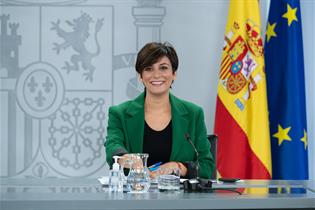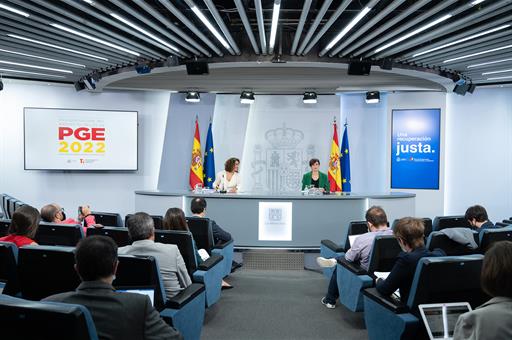Extraordinary Council of Ministers
The Government of Spain approves the draft General Budget for 2022
Council of Ministers - 2021.10.7
Moncloa Palace, Madrid
In an extraordinary meeting, the Council of Ministers has approved the draft General State Budget Law (PGE) for 2022, as announced by the President of the Government of Spain, Pedro Sánchez, after reaching an agreement in the coalition Executive.
At the press conference following the Council, the Minister for Territorial Policy and Government Spokesperson, Isabel Rodríguez, pointed out that the PGE is the main tool for making progress towards the fundamental objective: "a fair recovery". For her part, the Minister for Treasury and Public Function, María Jesús Montero, stated that it will contribute to making Spain a more productive, competitive and sustainable country, to guaranteeing that economic improvement reaches all families and to strengthening the welfare state.
As an example of the transformative potential of this draft budget, Montero stressed that it represents the "greatest commitment" that has ever been made to young people, with a total of 12.5 billion euros, including direct aid of 250 euros to facilitate access to housing and the 400 euro youth cultural bonus. In addition, a record amount is earmarked for scholarships - 2.199 billion - and a system is created in this area to help aspiring judges, public prosecutors, state attorneys and lawyers in the administration of justice.
Another pillar of the PGE is the "unprecedented" investment in science and innovation as engines of growth and welfare. Specifically, 13.298 billion euros is dedicated to research, development, innovation and digitalisation. The minister also stressed that the public accounts include the largest investment in history - 40 billion euros -, that six out of every ten euros will be used for social spending and that employment policies, support for industry and SMEs and resilient infrastructures and ecosystems will be considerably strengthened.
María Jesús Montero assured that all citizens "gain" with this Budget and especially the middle and working classes "because they will have better public services", and the self-employed and SMEs, which will have historic allocations to modernise and be more competitive in a globalised world.
Growth and improved tax collection
 Foto: Pool Moncloa/Borja Puig de la BellacasaThe Minister for Treasury and Public Function recalled that the tax rules are still suspended by the European authorities and that there is "quite a lot of consensus" that stimulus policies should be maintained so as not to damage growth. These public accounts, she pointed out, seek to play the role of a "locomotive" to drive the activity and transformation that Spain needs.
Foto: Pool Moncloa/Borja Puig de la BellacasaThe Minister for Treasury and Public Function recalled that the tax rules are still suspended by the European authorities and that there is "quite a lot of consensus" that stimulus policies should be maintained so as not to damage growth. These public accounts, she pointed out, seek to play the role of a "locomotive" to drive the activity and transformation that Spain needs.
As the First Vice-President of the Government of Spain and Minister for the Economy and Digital Transformation, Nadia Calviño, had already announced, the economy will grow next year at a rate of 7%. This, combined with rising domestic demand and job creation, will improve tax revenues. Specifically, tax revenues will increase by 10.8% this year, a development which, according to Montero, has been compatible with strong measures to combat the increase in electricity prices, such as the reduction in VAT on electricity. Tax revenues are expected to grow by 8.1% next year.
The Treasury Minister explained that the draft law envisages establishing a minimum 15% rate for corporation tax, a measure backed by 130 countries and which has led to a firm proposal within the framework of the OECD. The initiative once again places Spain "at the forefront of international taxation", according to Montero, who also indicated that the Executive remains committed to approving a global tax reform.
European funds, a historic opportunity
The Treasury Minister has detailed that the non-financial spending limit of the 2022 PGE is 196.142 billion euros, a figure similar to that of the previous year and the highest spending ceiling in history.
 Foto: Pool Moncloa/Borja Puig de la BellacasaThe accounts include 27.633 billion for the Recovery, Transformation and Resilience Plan, 3.8% more than the previous year. Montero pointed out that nine out of every ten euros of this Plan are earmarked for investment and that 2022 will be when citizens and companies, especially SMEs, will perceive the full extent of the positive effects of a "unique opportunity" that Spain cannot afford to miss.
Foto: Pool Moncloa/Borja Puig de la BellacasaThe accounts include 27.633 billion for the Recovery, Transformation and Resilience Plan, 3.8% more than the previous year. Montero pointed out that nine out of every ten euros of this Plan are earmarked for investment and that 2022 will be when citizens and companies, especially SMEs, will perceive the full extent of the positive effects of a "unique opportunity" that Spain cannot afford to miss.
All items of the expenditure budget show increases, except for debt interest payments, thanks to the improvement in public finances. The minister referred in particular to the increase in personnel expenditure - due to the 2% rise in public employees' salaries and the higher public employment offer - as well as the 1.465 billion reserve for vaccines against COVID-19 and the increase in public investment and capital transfers by 8.6% and 9.9%, respectively.
Almost 60% of social spending
In terms of social spending, 59.8% of the national budget, i.e. excluding European funds, is aimed at this: 240.375 billion euros, the highest figure in history. Pensions will increase by 4.8%, according to Montero, who pointed out that their revaluation will be determined by the law currently passing through the Lower House of Parliament, which establishes that contributory pensions will increase according to the average CPI recorded in the month of November. Non-contributory benefits will increase by 3% in 2022, and the same percentage will be added to the Minimum Basic Income.
Other items that are growing notably are dependency (23.3% more), the Heating Discount Rate (44%), the prevention of gender violence, the fight against child poverty - which will finance the new Comprehensive Childhood and Adolescence Protection Law -, the promotion of Vocational Training, access to housing and the promotion of building (more than three billion), trade, tourism and SMEs, R&D (investment is practically doubled compared to 2020) and policies against depopulation.
The new youth cultural bonus, which aims to bring the new generations closer to culture and revitalise the sector, will be allocated 210 million euros. As for the youth rental bonus, an aid to facilitate the emancipation of young wage earners with low salaries, it will be allocated 200 million euros.
Commitment to budgetary stability
 Foto: Pool Moncloa/Borja Puig de la BellacasaThe Ministry of the Treasury and Public Function stressed that the Executive remains committed to reducing the deficit and public debt. Thus, despite the increase in spending and investment, public debt will fall to 119.5% of Gross Domestic Product (GDP) this year and will stand at 115.1% of GDP next year. For its part, the public deficit will fall to 5% of GDP by 2022, more than halving in two years.
Foto: Pool Moncloa/Borja Puig de la BellacasaThe Ministry of the Treasury and Public Function stressed that the Executive remains committed to reducing the deficit and public debt. Thus, despite the increase in spending and investment, public debt will fall to 119.5% of Gross Domestic Product (GDP) this year and will stand at 115.1% of GDP next year. For its part, the public deficit will fall to 5% of GDP by 2022, more than halving in two years.
The Government has helped workers, families, the self-employed and entrepreneurs during the pandemic, which has increased the deficit, but it has also laid the foundations for a recovery that allows rapid progress towards budgetary stability. Most of the deficit is being assumed by the central government, which will continue to provide ordinary and extraordinary resources to the social security system as well as to the regional governments and local councils. The 2022 PGE incorporates an additional seven billion euros in funding for regional executives, and local councils will also receive record funding next year.
These public accounts, the minister concluded, are extraordinary both quantitatively and qualitatively, they think of the middle classes and the most vulnerable and take care of SMEs and the self-employed, because "we all have to think about moving forward together".
Future Housing Law
In response to questions from journalists, Isabel Rodríguez and María Jesús Montero coincided in highlighting the importance of the future Housing Law, announced this week by the President of the Government of Spain, for young people and the most vulnerable groups.
 Foto: Pool Moncloa/Borja Puig de la BellacasaThe Government Spokesperson pointed out that the law will regulate, for the first time, the constitutional right to housing, with full respect for regional powers and with the aim of guaranteeing "young people whose jobs and salaries do not allow them to have a home or rent one" access to them in order to be able to emancipate themselves and develop their life projects.
Foto: Pool Moncloa/Borja Puig de la BellacasaThe Government Spokesperson pointed out that the law will regulate, for the first time, the constitutional right to housing, with full respect for regional powers and with the aim of guaranteeing "young people whose jobs and salaries do not allow them to have a home or rent one" access to them in order to be able to emancipate themselves and develop their life projects.
The Minister for Treasury and Public Function, for her part, stated that "those who say that those who have a job have guaranteed housing are not walking the streets and are out of touch with reality", and insisted that this problem affects many young people, especially in large cities and in stressed areas.
Montero explained that the items included in the General State Budget offer the "legal umbrella" for the measures included in the law and its subsequent regulatory development to be implemented.
Although there is still no date foreseen for its approval by the Council of Ministers, Isabel Rodríguez has assured that it is imminent, because it is a priority of the coalition Executive, also with the aim of allowing the transformation and modernisation of the construction sector, so that it can act as an engine for development.
The spokesperson stressed that the rehabilitation and promotion of housing and social renting received an important boost last Tuesday through the plans agreed by the Government, with an investment of 4.42 billion euros that could generate employment for 180,000 people.
Non official translation





